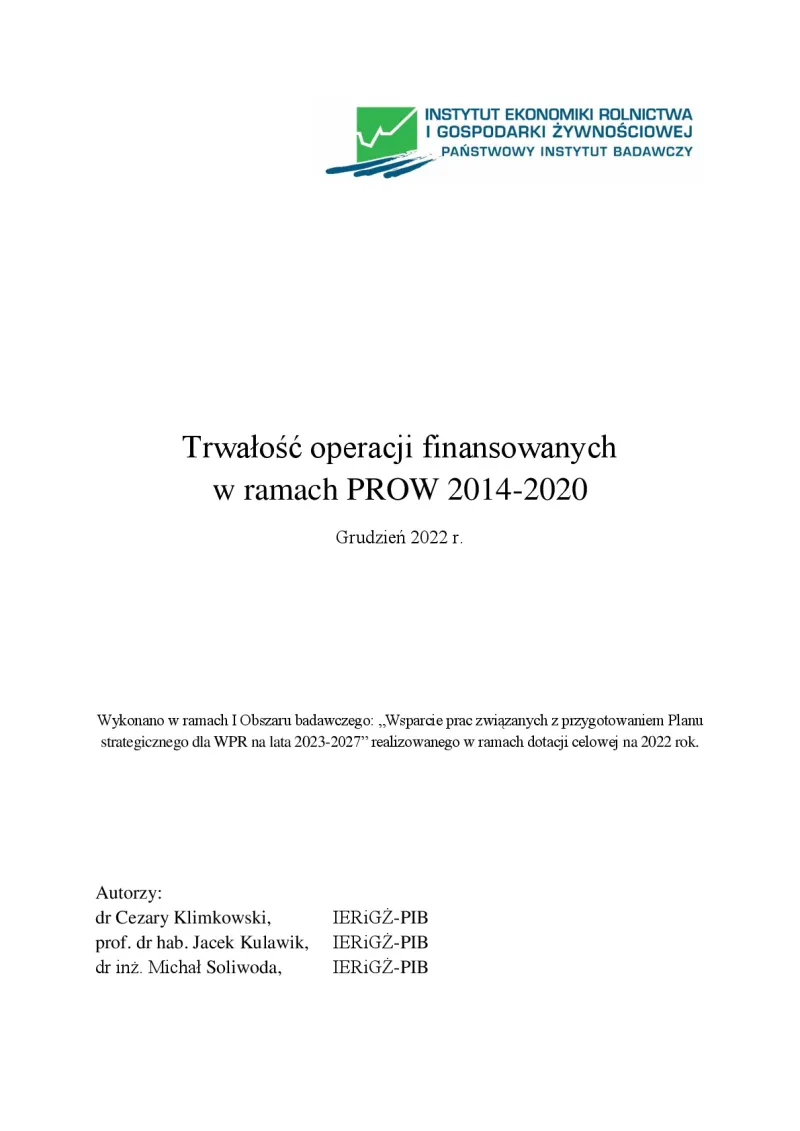Sustainability of operations financed under the 2014-2020 RDP
The evaluation focuses on how the Rural Development Programme (RDP) contributed to enhancing market orientation and increasing farm competitiveness.
- Poland
- 2014-2022
- Environmental impacts

The evaluation, which covers the 2014-2020 period and was commissioned by the ministry of agriculture and rural development, assesses the RDP’s contribution to Specific Objective 2 (SO2) to enhance market orientation and increase farm competitiveness both in the short and long term, including greater focus on research, technology and digitalisation.
Detailed objectives are related to: 1) what types of production/services/investment influence farm sustainability; 2) what other factors influence the sustainability of operations; 3) what are the main difficulties in running a farm; and 4) does the support reach the right target group?
The primary method used in this evaluation is a survey conducted among beneficiaries and experts from agricultural advisory centres. The main analytical method was descriptive statistics (percentages of answers).
Additional methods were desk research based on the relevant literature and content analysis to identify definitions and theories, and quantitative analysis (descriptive statistics) of secondary data.
The main challenges are related to the method of data collection, i.e. survey. Respondents (beneficiaries) were concerned about the credibility of the survey and the sincerity of the intentions of the institutions that carried out the survey. No other limitations and data gaps were reported.
The evaluation highlights the necessity of precisely defining the concept of 'sustainability' and proposing a measurement and assessment procedure. The practice so far emphasises the evaluation of investment profitability, taking into account indicators based on the time value of money; little attention is paid to capturing the risk and uncertainty of investments.
The surveyed beneficiaries of both analysed sub-measures (modernisation of agricultural holdings and development of agricultural services) declare considerable optimism concerning sustainability. Regarding modernisation, 56% of respondents declare that the investment they made would definitely meet the primary objectives, and the next 35% state that there is a high level of probability of meeting the primary objectives set for it after five years from the granting of aid. In the case of the development of agricultural services, 37% declare that they are certain about the sustainability of the investment, and the next 48% expressed a high probability of sustainability.
For beneficiaries of the sub-measure on modernisation of agricultural holdings, the chances of sustainability are higher for farms specialising in dairy or horticultural production. Sustainability is positively influenced by investments that involve the purchase of machinery and equipment for sowing and planting, as well as the construction of a building or structure for agricultural production. The chances of sustainability also increase with the scale of investments made. The biggest barriers to preserving sustainability are the problems of acquiring the right level of owned classical factors of production (land, capital, labour). The impact of price conditions, unfavourable climatic and weather conditions and epidemic animal diseases is also important.
In the case of agricultural service development, combine harvesters and other harvesting and fertilising machinery, tools, and equipment are considered the most promising types of investment. A positive relationship was shown to exist between the scale of investment and the chances of sustainability. At the same time, constraints in access to labour and capital are a significant threat to sustainability. The most important external factors that can threaten sustainability are the cost of labour and capital procurement prices, and factors determining the demand for agricultural services (e.g. the level of agricultural commodity prices, competition from other service providers and the shadow economy). The main barriers to the development of agricultural services are the rising fuel and energy prices and intensifying competition in this market.
The main conclusion of the research is that the long-term sustainability of operations highly depends on the prevailing price trends in markets for agricultural raw materials and agricultural inputs. The economic condition of farms is the most important variable determining sustainability. In turn, no other elements that could negatively affect the sustainability of the operations analysed are captured.
The primary recommendation is to maintain the current support. As for the recommended changes, in the case of the modernisation of agricultural holdings, it might be considered to implement the requirement that the application of the gross value added (GVA) increase will depend on changes in price conditions. In the case of agricultural service development, it is recommended to expand the types of activities supported further.
Author(s)
Institute of Agricultural and Food Economics (Instytut Ekonomiki Rolnictwa i Gospodarki Żywnościowej – PIB)